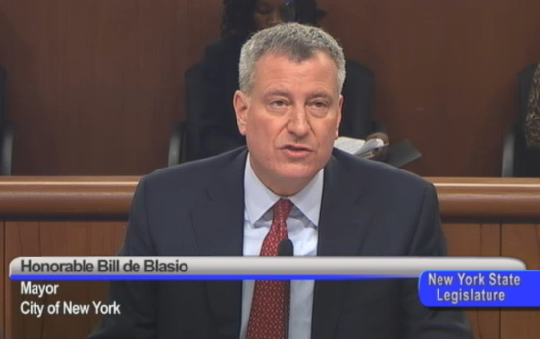Update [February 26]: The quote from the mayor has been updated to include his full response.
At a hearing in Albany this morning, Mayor Bill de Blasio defended the new city law that enables police to file misdemeanor charges against drivers who injure or kill people with the right of way. He also shed some light on how officers determine whether to file charges.

State Senator Marty Golden, who represents Bay Ridge, focused on the high-profile arrests of bus drivers who have killed or injured pedestrians in crosswalks. Golden asked if the Right-of-Way Law is even necessary. “If it’s an accident, it’s an accident. Do we need to arrest these people, and is that necessary?” Golden asked. “Should we be locking up bus drivers?”
Here is the heart of the mayor's response:
Senator, the law that was passed by the City Council, which I signed, makes clear that when an individual fails to yield to pedestrians where they should — the pedestrian has the walk sign and they’re crossing the street and there’s still a crash... what the law dictates is that if there is serious injury or fatality, and if the officers on the scene determine that it was an avoidable injury or fatality, they are obligated to pursue an arrest. If the officers determine that it was unavoidable, meaning something happened that no driver could have possibly foreseen or responded to in time, they have the option of giving a summons. So this is a new law with a clear standard. It is a stricter standard than that which existed previously, and that’s for a reason, because people were being killed and grievously hurt in all sorts of instances and there wasn’t a clear enough legal consequence. So the law, I think, has been a step forward. It should be applied respectfully and sensitively, especially — I agree with you — our public service workers always deserve respect in every situation, and I appreciate the work they do. But again, the officer on the scene has to make a determination... If the officer believes it was 100 percent avoidable, that is an arrest situation.
At an MTA press conference minutes later, Daily News reporter Pete Donohue asked MTA Chair Tom Prendergast whether he thought bus drivers who injure or kill pedestrians in crosswalks should be subject to the Right-of-Way Law. Prendergast's response avoided answering questions about the law itself.
“For whatever reason, the legislation was written the way it was. I’m not going to get into details of it,” Prendergast said, stressing that bus driver unions, the city, and the MTA alike are working to reduce crashes. “I drove a bus for 30 days," Prendergast said. "The two hazards that you’re most faced with are right turns and left turns, and so I can totally appreciate the difficulties bus drivers have."
While Prendergast did not address how the law is enforced or whether bus drivers should receive the special exemption that the TWU is seeking, he did say the MTA may adjust bus routes to limit turns through crowded crosswalks and may ask DOT to offset pedestrian crossings to minimize conflicts. (In the 1990s, the Giuliani administration moved some Midtown crosswalks to mid-block locations and installed pedestrian barriers at corners, which remain in place today.)
During de Blasio's testimony, Assembly Member Denny Farrell complained about pedestrians waiting just off the curb before crossing the street. This behavior doesn't register as a factor in studies of severe traffic injuries, but de Blasio replied: "Even though vehicles are the centerpiece of the challenge, pedestrians have a responsibility too."
Later, Assembly Member Joe Borelli of Staten Island expressed skepticism about city data showing the safety benefits of speed cameras. "The jury’s already come back," de Blasio said of speed cameras and reduced speed limits. “There is no question that it is working."
Assembly Member N. Nick Perry complained that bus lanes on Utica Avenue, which have reduced bus travel times by up to 15 percent [PDF], are a "ticket trap" that were "implemented without any proper study." De Blasio defended bus lanes generally ("we want to speed up mass transit") and said Perry will receive a reply from DOT about reducing the number of hours the bus lanes are in effect.
In his testimony, de Blasio highlighted the threat posed by dwindling state and federal infrastructure funding. "The state must also do more to fund the MTA’s capital plan, a situation that is reaching crisis levels," de Blasio said. "The current MTA capital plan is woefully underfunded... [and] the governor’s contribution of just $750 million does not begin to address the critical needs."
De Blasio has not committed additional city funds to the MTA, which is a state authority whose budget Albany has repeatedly raided in recent years. The mayor also did not endorse a specific funding source, such as toll reform, which requires Albany approval. But he did say the state must come up with a solution to fill the capital plan's $15.2 billion gap. "We cannot ask riders alone to sustain the system with fare increases," he warned.





